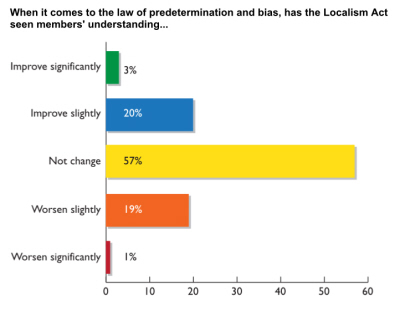Raising the standards
- Details
 How has the revised standards regime – with its lighter touch – worked out in practice? Has clarification of the law on predetermination and bias made any difference? And could we see a return to committees? Derek Bedlow and Philip Hoult report
How has the revised standards regime – with its lighter touch – worked out in practice? Has clarification of the law on predetermination and bias made any difference? And could we see a return to committees? Derek Bedlow and Philip Hoult report
While for areas such as trading and charging it may still be early days, it is clear from the survey that respondents have already formed strong opinions on arguably the most controversial part of the 2011 Act – the dismantling of the old standards regime.
This saw the scrapping of the Standards Board and its replacement with a ‘lighter touch’ system including disclosable pecuniary interests and independent persons.
When the new arrangements came into force on 1 July 2012, the then Local Government Minister Bob Neill MP claimed that the old regime had led to “an explosion in petty, partisan and malicious complaints that dragged down the reputation of local government, as well as suppressing freedom of speech”.
But the verdict from our respondents on the changes was mixed to say the least. On a positive note, more than one in five (22%) said the reforms have led to a fall in the number of vexatious complaints.
However, a significant minority (15%) argued that the number of vexatious complaints had increased, while three in five (63%) said the measures had made no difference.

This diversity of opinion is reflected in the comments made by respondents:
• “There was never a problem with vexatious complaints, just the way some councils manage them”;
• “Complaints by members about members have decreased – complaints from the public have increased”;
• “This is more to do with the fact that members think ‘What’s the point – given there are no teeth in the new system’ – as opposed to any positive effect of the new system”;
• “There’s a false assumption that vexatious complaints rise/fall dependent on the complaints regime in place. Your average vexatious complainant will complain whatever is in place”;
• “We had very few complaints, vexatious or otherwise, before the Localism Act changes and this has not altered”.
One in four respondents (25%), meanwhile, reported that councillors’ behaviour had worsened since the reforms came into effect. Just 4% claimed that it had led to improved behaviour, while 71% said it had made no difference.
Interestingly, the role of the ‘independent person’ (IP) in the handling of conduct complaints has been well received. Exactly half of respondents said the role was working either very well or quite well, compared with 7% who considered it to be working either quite badly or very badly. (For more on the IP role, see: ‘Independent: It is. Are they?’)
|
Independent. It is. Are they? “I struggle to think of a more pointless statutory role.” The introduction of the ‘independent person’ post through the Localism Act might not have impressed this particular respondent, but the feedback in general was largely positive. Of those who took part in the survey, half (50%) concluded that the role was working either very well or quite well. Just 7% believed it to be working either quite badly or very badly. The remainder (43%) said the role had made no difference. “I was sceptical about the role but have concluded that it is a very good idea,” said one respondent. Others suggested that the independent person could act as a “good sounding board” and that “their advice is valuable”. Despite this largely favourable reaction, a number of issues were identified. These included finding the right person to fill the role. It is “very difficult to get suitably qualified persons”, wrote one respondent. Another said: “We have used our IP twice, but with little great benefit to the process and difficulties with the person appointed.” A third wondered: “Are these people independent or just the usual suspects?” Other problems included an absence of clout – “the IP is of no real relevance in the new system; they need a real decision-making role to make any difference” – and the lack of understanding outside the council as to what the independent person’s role is. Many independent persons also appear to be under-utilised. “The IP, while a very nice person, has no impact or real role,” wrote one respondent. Comments such as “not yet tested”, “I have nothing for them to do” and “we have had no complaints so no cause to call on the independent person” were also typical. Another senior governance officer pointed to their council’s decision to retain a standards committee with non-voting members from outside the authority as a reason why there was no real need for an ‘independent person’. One solution may be to give the post-holders more to do. “We chose to give our IP a wider role at initial assessment,” reported one respondent. |
Sanctions busting
The key deterrent in the regime is, of course, the need to disclose pecuniary interests. Bob Neill argued that this system of DPIs would take a “tough stance on council corruption”, and bring in the “sunlight of transparency”. On the plus side, just six respondents revealed that they had had to report a failure to disclose to the police.
However, it is clear from the survey that respondents feel the current sanctions available under the revised regime are insufficient. Some 85% believed that these sanctions were ‘too weak’, compared with 13% who felt they were ‘about right’. Just 2% said they were too tough.
It is no surprise, then, to hear that the introduction of a wider range of ‘meaningful’ sanctions was the most frequent reply when respondents were asked in what ways the standards regime for local government could be improved. And at the top of this wishlist is the reintroduction of the power to suspend a member.
“There are no methods with which to deal with difficult members,” said one senior governance officer. “With less teeth to the regime than before, any poor conduct is not complained about as there is little effect other than further deteriorating relationships.”
Similarly, one respondent complained of the lack of a middle ground between the criminal sanctions in relation to DPIs and censure. “I do not understand why this part of the governance legislation was changed as it is clearly worse now than before. A case of ‘baby with the bathwater’ in my view.”
There were also calls for sanctions to tackle the behaviour of some members towards staff that in an employment context would give rise to serious claims of misconduct.
Getting personal
Respondents would also like to see greater clarity in relation to DPIs and personal interests.
“The law in relation to DPIs needs to be rewritten to be understandable to lawyers, let alone members,” said one. Another added: “The statutory definition of DPIs, both as an asset to be registered and as an interest at a meeting, is a complete mess.”
The definition of a DPI was deemed unsatisfactory by another respondent, who said: “It is uncertain in its scope, which is dangerous, given the criminal sanction.” The Department for Communities and Local Government [DCLG] guidance was fine, they said, but “it would be preferable if the poorly drafted legislation actually mirrored the guidance”.
Meanwhile one respondent suggested that the legislation needed to refer to wider categories of interest – “to include where wider family members or friends are affected, not just the spouse”.
Particular problems are also identified with parish councils. Calling for the introduction of a body to deal with general complaints at this tier, one exasperated lawyer wrote: “Parishes increasingly feel they are only accountable to themselves and the district can’t really do anything, and therefore can get away with bad decisions that can’t be pinned down to particular individuals.”
Another senior governance officer argued that either responsibility for parish councils should be removed or standards committees should be given effective power over parish councillors, for example through an obligation to co-operate, the imposition of sanctions and so on.
These views were largely echoed at the subsequent roundtable session, where one delegate summarised the effect of the new regime as follows: “The new regime does enable complaints to be dealt with more quickly, which is good for trivial complaints, but not for serious complaints,” he said. “The public is less happy because they’re not seeing anything being done.”
Where it works, the new emphasis on the parties disciplining errant members was welcomed by the roundtable, but it was also noted that in some councils, political considerations could take precedence and sanctions against independents were almost non-existent.
On the other hand, the flexibility of the new regime was welcomed at some councils and it was also credited with helping to repair the relationship between monitoring officers and members. “Under the old regime, lawyers would get the blame for ‘stifling democracy’,” said one roundtable delegate. “It didn’t help lawyers at all – it created a wedge between the lawyers and the members.
“It was not right for officers of a local authority to be involved in a sanctions regime and disciplining members. It should be the groups and members themselves that take responsibility.”
Open and shut case?
In addition to revamping the standards regime, the Government also sought through the 2011 Act to clarify the rules on predetermination and bias, which the DCLG’s Plain English guide claimed had previously been interpreted in such a way as to reduce the quality of local debate and stifle valid discussion.

“In some cases councillors were warned off doing such things as campaigning, talking with constituents or publicly expressing views on local issues, for fear of being accused of bias or facing legal challenge,” it suggested. “The Localism Act makes it clear that it is proper for councillors to play an active part in local discussions, and that they should not be liable to legal challenge as a result. This will help them better represent their constituents and enrich local democratic debate.”
So how has it worked out? Interestingly, the number of respondents (23%) who said the Act had improved members’ understanding of the rules was almost exactly the same as those (20%) who felt it had worsened councillors’ understanding.
The vast majority of respondents (82%), meanwhile, felt that clarification of the law via the Act had made little or no difference to the quality of decisions. The remainder was split equally (at 9% each) between those who thought it had improved the robustness of members’ decision-making and those who felt it had left decisions more vulnerable to legal challenge.
A number commented how statements by Government ministers had left councillors thinking they had more latitude than before.
“Some members think there is no longer such a thing as predetermination or bias”, said one. Another reported: “Members gained the impression from Government information that the new provision allowed them greater freedom than before, but it simply recites the existing legal position.” A third said: “Members have the view that they can do what they like because Eric Pickles said so.”
However, one senor governance officer welcomed the clarification. “It is useful to be able to cite the Act’s provision, especially to complainants who don’t understand the law.” Another suggested that it means “members are at least thinking about it [the issue]”.
Various respondents nevertheless highlighted the need for continued engagement with and training of members on the issue. As one reported: “We regularly engage with members on how they think we are treating predetermination and they remain satisfied with our approach.”
Back to the future?
The Localism Act 2011 handed local authorities the option of moving away from an executive form of governance to a committee system. There has yet to be a rush to return to the committee system, but the trickle may yet turn into a flood.
So far, just 3% of the councils surveyed had used the provisions of the Localism Act to go back to the old way of doing things, with a further 4% currently mulling it over. Nine per cent of councils had considered but rejected it, while the remaining 84% said they had no plans to replace the Cabinet system.
This was to the regret of some members of the roundtable. For its proponents, the Cabinet system speeds up the decision-making process and enables those with the skills free rein to drive their portfolios forward with less interference. On the downside, however, the concentration of responsibility in a single person creates continuity risks if that person steps down. More generally, members of the roundtable recognised that the Cabinet system is less effective in a council with a minority administration or one with a small majority.
Some members of the roundtable thought there might be a drift back to the committee system as more of the shortcomings of Cabinet governance become apparent. In particular, the negative effect of the Cabinet system on the power and role of the full council, especially in relation to budget setting, may cause its demise in some authorities, while the Cabinet system can also create an ‘opposition’ of disaffected backbench councillors within majority parties who have less of a role.
“The penny may drop when people realise the advantages of the committee system when difficult decisions have to be made, especially over the budget and that may prompt some councils to return to the committee system,” said one attendee.
If this were to come to pass, then it would be welcomed by many local authority lawyers who lament the demise of the committee system because of the experience it gave trainees and, more generally, the opportunity it provided for officers and members to work together.
Said another roundtable attendee: “If you work in a political environment you have to understand how members operate and something I miss from the days of the committee system is the exposure that officers got to members. If you’re not aware of the impact on members of what you’re doing, it does affect the quality of decision-making.”

Legal Adviser
Legal Director - Government and Public Sector
Deputy Director Legal and Democratic Services
Governance Lawyer
Regulatory/Litigation Lawyer
Locums
Poll


















